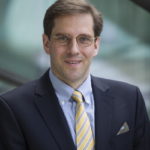Kajetan von Eckardstein, M.D. (NS ’08)
 Board member
Board member
Chair, Neurosurgical Department
Westpfalzklinikum Kaiserslautern
Kaiserslautern, Germany
“I dreamed of getting formal medical training in the U.S. I passed the United States Medical Licensing Examination. My first mentor and chair during residency in Berlin, Jürgen Kiwit, M.D. (NS ’91), advocated for Mayo Clinic as one of the finest places to aim for.”
- Clinical fellowship: Neurologic surgery, Mayo Clinic School of Graduate Medical Education, Rochester, Minnesota
- Residency: Neurologic surgery, Helios Klinikum Berlin, Klinikum Buch, Berlin, Germany
- Medical school: Humboldt Universität Berlin Medical School; Freie Universität Berlin Medical School ∙
- Native of: Munich, Germany
Why did you decide to pursue medicine?
As a 16-year-old I spent a year abroad in an all-boys boarding school in Woodberry Forest, Virginia. I took part in a superb AP biology class where we did animal dissections of increasing complexity, beginning with worms and studying rats in the final term. I remember being completely fascinated with the beauty of anatomy and complexity of physiology.
Why did you train at Mayo Clinic?
During medical school I did short-term clinical rotations at the University of Texas Health Science Center at Houston and New York University School of Medicine. I dreamed of getting formal medical training in the U.S. I passed the United States Medical Licensing Examination. My first mentor and chair during residency in Berlin, Jürgen Kiwit, M.D. (NS ’91), advocated for Mayo Clinic as one of the finest places to aim for. I learned about the international fellowship program offered by the Department of Neurologic Surgery and decided to apply.
What were your initial impressions of Mayo Clinic?
My wife and I visited Rochester for the first time in January 2005. Our first impression was low temperatures and a blizzard. However, we experienced a warm welcome from department chair David Piepgras, M.D. (NS ’74), and his wife and other Mayo staff and future colleagues who encouraged me to pursue the fellowship.
I started my fellowship in summer 2006 and was highly impressed with the facilities and resources of the Mayo campus — the neatness of the buildings, information technology infrastructure and prompt availability of diagnostics such as MRI scanners. But also the organized way new employees were officially welcomed and oriented.
I was impressed with the quality of training of assistant personnel such as nurses and physician assistants. The better and more experienced they are, the more doctors are able to focus on their core skills.
How does Mayo Clinic influence your practice?
Besides learning from outstanding surgeons, I have truly understood the necessity of the Mayo dictum — the needs of the patient come first. Although this is challenged day to day in my practice by shortness of time and funds, nothing else really matters in the end. I have learned to listen to patients more carefully. Being a non-native speaker might have helped. Jokes aside, really understanding patients’ symptoms and needs forms the basis for proper treatment decisions.
What do you contribute to the Mayo Clinic Alumni Association?
I would love to add an international perspective to the Board. The Mayo brothers traveled abroad and believed in professional exchange of ideas and techniques in the same way as many international researchers and physicians travel to the three Mayo sites today.
What do you do in your spare time?
I try to spend most of my spare time with my wife and four children. I also like to go hunting and read a good book.
What would people be surprised to know about you?
I was a member of the first German national lacrosse team in 1994. We took part in the world championship in Manchester, United Kingdom – enthusiastically but very unsuccessfully!